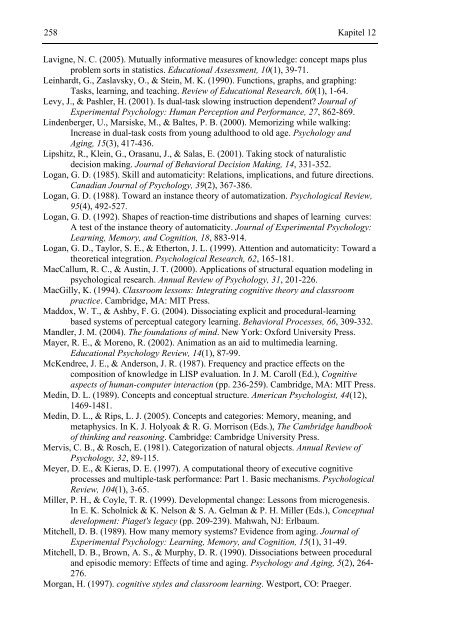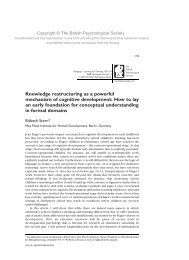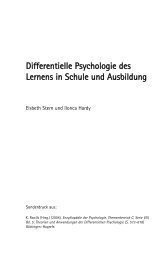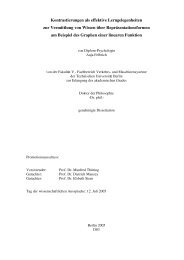Konzeptuelles und prozedurales Wissen als latente Variablen: Ihre ...
Konzeptuelles und prozedurales Wissen als latente Variablen: Ihre ...
Konzeptuelles und prozedurales Wissen als latente Variablen: Ihre ...
Erfolgreiche ePaper selbst erstellen
Machen Sie aus Ihren PDF Publikationen ein blätterbares Flipbook mit unserer einzigartigen Google optimierten e-Paper Software.
258 Kapitel 12<br />
Lavigne, N. C. (2005). Mutually informative measures of knowledge: concept maps plus<br />
problem sorts in statistics. Educational Assessment, 10(1), 39-71.<br />
Leinhardt, G., Zaslavsky, O., & Stein, M. K. (1990). Functions, graphs, and graphing:<br />
Tasks, learning, and teaching. Review of Educational Research, 60(1), 1-64.<br />
Levy, J., & Pashler, H. (2001). Is dual-task slowing instruction dependent? Journal of<br />
Experimental Psychology: Human Perception and Performance, 27, 862-869.<br />
Lindenberger, U., Marsiske, M., & Baltes, P. B. (2000). Memorizing while walking:<br />
Increase in dual-task costs from young adulthood to old age. Psychology and<br />
Aging, 15(3), 417-436.<br />
Lipshitz, R., Klein, G., Orasanu, J., & Salas, E. (2001). Taking stock of naturalistic<br />
decision making. Journal of Behavioral Decision Making, 14, 331-352.<br />
Logan, G. D. (1985). Skill and automaticity: Relations, implications, and future directions.<br />
Canadian Journal of Psychology, 39(2), 367-386.<br />
Logan, G. D. (1988). Toward an instance theory of automatization. Psychological Review,<br />
95(4), 492-527.<br />
Logan, G. D. (1992). Shapes of reaction-time distributions and shapes of learning curves:<br />
A test of the instance theory of automaticity. Journal of Experimental Psychology:<br />
Learning, Memory, and Cognition, 18, 883-914.<br />
Logan, G. D., Taylor, S. E., & Etherton, J. L. (1999). Attention and automaticity: Toward a<br />
theoretical integration. Psychological Research, 62, 165-181.<br />
MacCallum, R. C., & Austin, J. T. (2000). Applications of structural equation modeling in<br />
psychological research. Annual Review of Psychology, 31, 201-226.<br />
MacGilly, K. (1994). Classroom lessons: Integrating cognitive theory and classroom<br />
practice. Cambridge, MA: MIT Press.<br />
Maddox, W. T., & Ashby, F. G. (2004). Dissociating explicit and procedural-learning<br />
based systems of perceptual category learning. Behavioral Processes, 66, 309-332.<br />
Mandler, J. M. (2004). The fo<strong>und</strong>ations of mind. New York: Oxford University Press.<br />
Mayer, R. E., & Moreno, R. (2002). Animation as an aid to multimedia learning.<br />
Educational Psychology Review, 14(1), 87-99.<br />
McKendree, J. E., & Anderson, J. R. (1987). Frequency and practice effects on the<br />
composition of knowledge in LISP evaluation. In J. M. Caroll (Ed.), Cognitive<br />
aspects of human-computer interaction (pp. 236-259). Cambridge, MA: MIT Press.<br />
Medin, D. L. (1989). Concepts and conceptual structure. American Psychologist, 44(12),<br />
1469-1481.<br />
Medin, D. L., & Rips, L. J. (2005). Concepts and categories: Memory, meaning, and<br />
metaphysics. In K. J. Holyoak & R. G. Morrison (Eds.), The Cambridge handbook<br />
of thinking and reasoning. Cambridge: Cambridge University Press.<br />
Mervis, C. B., & Rosch, E. (1981). Categorization of natural objects. Annual Review of<br />
Psychology, 32, 89-115.<br />
Meyer, D. E., & Kieras, D. E. (1997). A computational theory of executive cognitive<br />
processes and multiple-task performance: Part 1. Basic mechanisms. Psychological<br />
Review, 104(1), 3-65.<br />
Miller, P. H., & Coyle, T. R. (1999). Developmental change: Lessons from microgenesis.<br />
In E. K. Scholnick & K. Nelson & S. A. Gelman & P. H. Miller (Eds.), Conceptual<br />
development: Piaget's legacy (pp. 209-239). Mahwah, NJ: Erlbaum.<br />
Mitchell, D. B. (1989). How many memory systems? Evidence from aging. Journal of<br />
Experimental Psychology: Learning, Memory, and Cognition, 15(1), 31-49.<br />
Mitchell, D. B., Brown, A. S., & Murphy, D. R. (1990). Dissociations between procedural<br />
and episodic memory: Effects of time and aging. Psychology and Aging, 5(2), 264-<br />
276.<br />
Morgan, H. (1997). cognitive styles and classroom learning. Westport, CO: Praeger.





